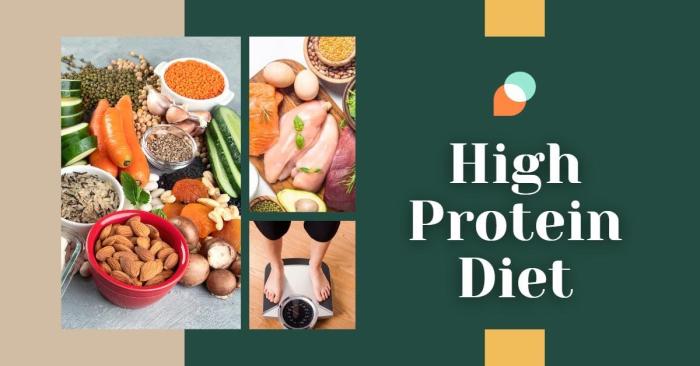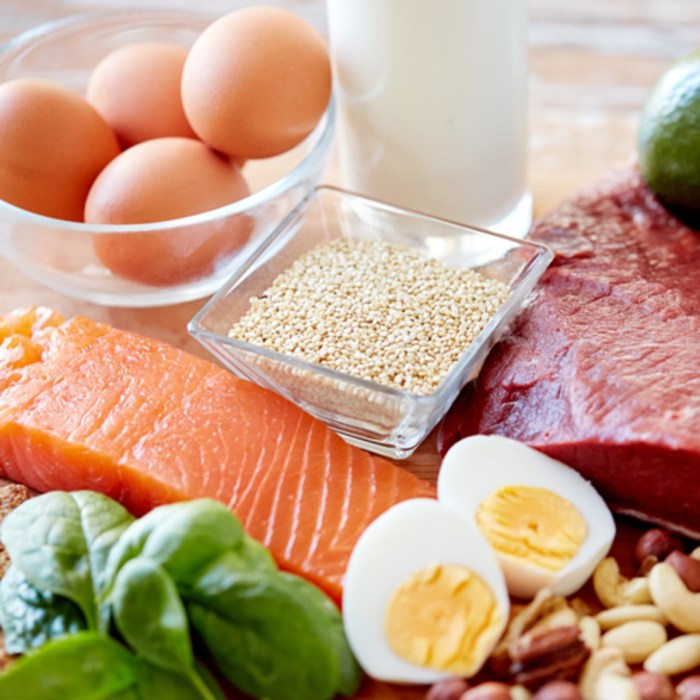
High-protein diet – the culinary superhero that swoops in to save your health and fitness goals! Imagine this: you’re battling the forces of flab with the mighty power of protein. Not only does it build your muscles like a brick house, but it also keeps those pesky hunger pangs at bay, making it a double whammy for your nutrition game!
From steak to beans, high-protein foods are not just about meat; they’re an entire buffet of options catering to everyone. With such a delicious lineup, you can feel the energy surging through your body as you embark on a journey through weight loss, muscle growth, and a lifestyle that’s not only healthier but also downright tasty!
Health and Nutrition
A high-protein diet is like a superhero cape for your health and nutrition, dramatically boosting your body’s performance and overall well-being. Whether you’re looking to build muscle, lose weight, or simply feel like a million bucks, increasing your protein intake can work wonders. Known for its satiating properties, protein helps keep hunger at bay while supporting a multitude of bodily functions.
So, buckle up as we dive into the delicious world of protein!
Benefits of a High-Protein Diet
When it comes to health, protein is the golden child of macronutrients. Let’s take a closer look at how a high-protein diet can benefit you in various fabulous ways:
- Muscle Growth and Repair: Protein provides the building blocks—amino acids—that your muscles crave after a workout. This is especially important for those engaging in strength training or strenuous activity. Your muscles will be thanking you as they grow and repair more effectively!
- Weight Management: High-protein diets can help manage weight by keeping you feeling full longer, which reduces those pesky snack cravings. Think of it as a buffet for your belly, where the main course is satisfaction!
- Boosted Metabolism: Protein has a higher thermic effect than fats or carbohydrates, meaning your body burns more calories digesting it. It’s like having a personal trainer for your metabolism, working overtime to keep you lean.
- Improved Bone Health: Contrary to popular belief, consuming adequate protein can actually support bone health, which is vital as we age. Strong bones help you stay active and fabulous for years to come!
High-Protein Foods and Their Nutritional Values
Choosing the right high-protein foods can feel like navigating a treasure map, but fear not! Here are some popular protein-packed foods and their nutritional values to help you on your quest:
| Food Item | Protein Content (per 100g) | Additional Nutrients |
|---|---|---|
| Chicken Breast | 32g | Low in fat, rich in B vitamins |
| Eggs | 13g | Rich in healthy fats, vitamins D and B12 |
| Greek Yogurt | 10g | Probiotics, calcium |
| Lentils | 9g | High in fiber, iron, and folate |
| Quinoa | 14g | Complete protein, high in magnesium |
| Almonds | 21g | Healthy fats, vitamin E |
Each of these foods brings a unique flavor and nutritional profile to your plate, transforming meals into delightful protein parties. By incorporating these tasty options into your daily diet, you’ll not only enhance your health but also keep your tastebuds dancing with joy.
Protein and Muscle Growth
Protein is a fundamental player in the game of muscle growth and repair. Think of it as your body’s construction crew, tirelessly working to build and maintain your muscle mass. After an exhilarating workout, your muscles undergo stress and tiny tears. This is where protein swoops in like a caped crusader, repairing those tears and helping your muscles grow back stronger.To optimize muscle gain, research indicates that consuming around 20-30 grams of high-quality protein post-workout can be incredibly effective.
This can come from a variety of sources, including:
- Protein shakes: Easy to prepare and deliciously versatile.
- Lean meats: Chicken, turkey, and fish are not just great for your tastebuds, but fantastic for your biceps!
- Plant-based proteins: Don’t underestimate the power of beans, legumes, and plant-based protein powders—they can pack a punch too!
In summary, a high-protein diet is like rallying the best players for your body’s health and muscle-building team. With the right foods and a sprinkle of humor, you can embark on the journey of fitness and well-being with confidence and flair!
Health and Obesity
High-protein diets have been making waves in the realm of weight loss and obesity management, much like a seal at a circus—entertaining and hard to ignore. The crux of the matter is that protein packs a punch when it comes to satiating hunger, boosting metabolism, and promoting muscle maintenance while trimming down body fat. So, let’s dive into the meaty details of how these diets stack up against the competition!
Role of High-Protein Diets in Weight Loss and Obesity Management
High-protein diets have been shown to create a sense of fullness, which is something we all crave, much like the last slice of pizza at a party. Research indicates that increased protein intake can lead to greater feelings of satiety and reduced overall calorie consumption. Studies suggest that participants on high-protein diets tend to lose more weight than those on lower-protein diets, as protein helps preserve lean muscle mass during the weight loss journey.
For example, a study published in the American Journal of Clinical Nutrition found that individuals following a high-protein diet lost more weight and had better body composition outcomes compared to those on traditional calorie-restricted diets. A protein-rich diet can also enhance thermogenesis, the process of heat production in our bodies, which means you’re not just burning calories while binge-watching your favorite series; you’re also revving up that metabolism like a sports car!
Effectiveness Compared to Other Popular Diets
When stacking high-protein diets against other popular methods such as low-carb and Mediterranean diets, it’s essential to recognize the unique advantages each brings to the table—figuratively speaking, of course. High-protein diets have shown remarkable effectiveness for weight control, primarily due to their satiating properties.
Low-Carb Diets
While low-carb diets, like the Atkins or ketogenic diets, can lead to quick weight loss due to carbohydrate restriction, high-protein options often provide a more sustainable approach. The protein helps maintain muscle mass, making it easier for dieters to keep the weight off.
Mediterranean Diets
On the other hand, Mediterranean diets focus on healthy fats and whole grains along with protein but may not offer the same level of satiation. High-protein diets tend to outshine in terms of immediate fullness, making it easier to stick to for those looking to lose weight swiftly.Research by the Journal of the American College of Nutrition indicates that high-protein dieters experienced greater short-term weight loss compared to those following other dietary plans.
However, the long-term success depends on individual preferences, sustainability, and lifestyle choices.
Challenges and Misconceptions Related to High-Protein Diets
While high-protein diets come with lots of pros, they also have their fair share of challenges and misconceptions. One common myth is that all protein sources are created equal, leading many to indulge in bacon and sausage while thinking they’re on the health track. Not all proteins are the same, and choosing sources like lean meats, legumes, and dairy is crucial for optimal health.Another misconception is that high-protein diets are synonymous with kidney damage.
Though this concern arises mainly for individuals with pre-existing kidney conditions, healthy individuals are generally safe to indulge without repercussions. Some potential challenges include the following:
Digestive Issues
Some dieters find that a sudden increase in protein can lead to digestive discomfort, often due to the lack of fiber in many protein-rich foods. Pairing protein with fiber-rich veggies is a winning combination to avoid these bloating woes.
Social Situations
High-protein diets may seem daunting in social settings where carb-laden foods reign supreme—hello, pizza parties! Planning ahead and bringing your protein-packed snacks can help you navigate these situations smoothly.
Expense
Quality protein sources, especially lean meats and seafood, can be pricier than their carb-heavy counterparts. Keeping an eye out for sales and bulk buying can help mitigate costs without compromising on your protein goals.In conclusion, while high-protein diets offer compelling benefits for weight loss and obesity management, it’s essential to navigate the landscape with knowledge of their challenges and misconceptions.
After all, knowledge is power—especially when that knowledge helps you reach for the right snacks!
Popular Diets

High-protein diets have strut onto the stage of popular nutrition trends like they own the place. From Keto to Paleo, these diets have taken the meat and potatoes of modern eating to a whole new level, sprouting protein-packed options that could make even the most earnest tofu cringed. In this section, we will explore how these high-protein diets find their way into the larger context of popular eating trends, giving a hearty nod to the nutritional wisdom they bring along.High-protein diets seamlessly blend into various popular diet frameworks, each putting a unique twist on how to incorporate protein-rich foods.
The Keto diet, with its low-carb, high-fat foundation, embraces the protein craze by allowing foods like steak, chicken, and fish to reign supreme. On the flip side, the Paleo diet champions whole, unprocessed foods, meaning protein sources such as lean meats and fish are staples—after all, cavemen didn’t have a fast-food drive-thru! Below, we’ve created a table that organizes various diets based on their protein content and other nutritional aspects, shedding light on how these diets stack up against each other.
| Diet | Typical Protein Content | Main Focus | Carbohydrate Focus |
|---|---|---|---|
| Keto | High (20-25% of daily intake) | Low-carb, high-fat | Very low |
| Paleo | Moderate to High (15-30% of daily intake) | Whole foods, no processed items | Moderate |
| Atkins | High (20-30% of daily intake) | Low-carb, high-protein | Low to very low |
| DASH | Moderate (15-20% of daily intake) | Heart health, balanced diet | Moderate |
| Mediterranean | Moderate (15-20% of daily intake) | Plant-based, healthy fats | High (but healthy carbs) |
Designing a balanced meal plan that incorporates high-protein options can be as easy as pie—well, at least if that pie is made from lean turkey and lots of veggies. For each diet mentioned, consider the following components to create a high-protein meal plan:
1. Protein Sources
Include lean meats, fish, eggs, legumes, and dairy as staples.
2. Healthy Fats
Use avocados, olive oil, and nuts to keep meals satisfying and in line with Keto or Paleo.
3. Veggie Wonders
Load up on fiber-rich vegetables to complement protein intake while keeping the meal balanced.
4. Smart Carbs
If the diet allows, choose whole grains or legumes in moderation to round out meals in a healthy way.By artfully mixing these ingredients, you can whip up meals that not only satisfy hunger but also align with the principles of popular diets. Think grilled chicken salad for Paleo or a delicious beef stir-fry for Keto; the options are as endless as your appetite for protein!
Last Word

In conclusion, embracing a high-protein diet is like taking a joyride on the highway of health! With the power to help manage weight, boost muscle repair, and fit seamlessly into trending diets, it’s an approach that promises satisfaction and sustenance. So, grab your favorite protein-packed snacks and get ready to flex not just your muscles but your culinary creativity too!
Questions Often Asked
What are the best sources of protein?
Some of the best sources include lean meats, fish, eggs, dairy products, legumes, and nuts.
Can a high-protein diet lead to kidney issues?
For healthy individuals, a high-protein diet is safe; however, those with preexisting kidney conditions should consult a doctor.
How much protein do I need daily?
Generally, adults should aim for 0.8 grams of protein per kilogram of body weight, but athletes may need more.
Is protein important for weight loss?
Absolutely! Protein helps keep you full longer, reducing overall calorie intake and supporting muscle preservation during weight loss.
Can I get enough protein from a vegan diet?
Yes, there are plenty of plant-based proteins such as lentils, chickpeas, quinoa, and tofu that can meet your protein needs.






